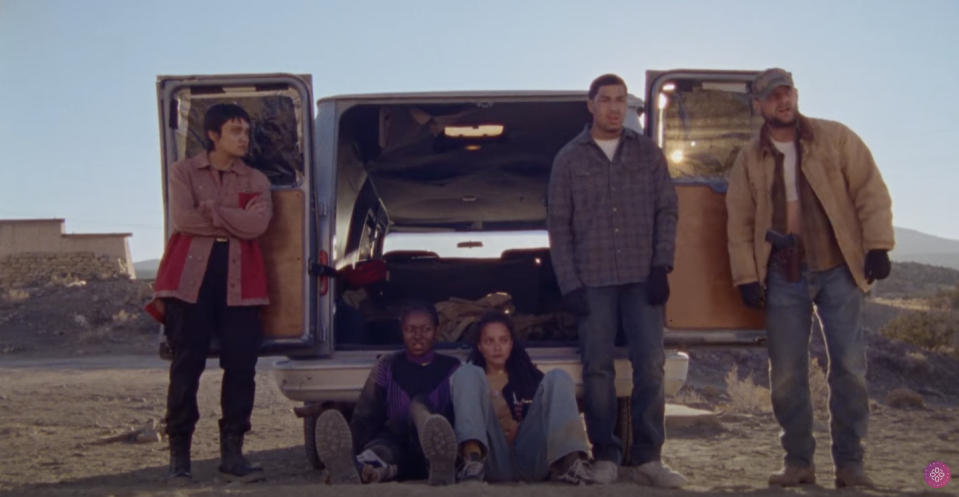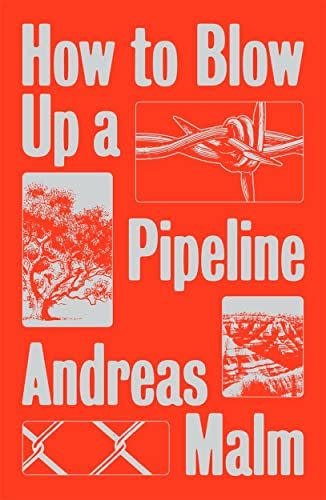'How to Blow Up a Pipeline' Will Detonate Your View of the Climate Crisis

- Oops!Something went wrong.Please try again later.
- Oops!Something went wrong.Please try again later.
"Hearst Magazines and Yahoo may earn commission or revenue on some items through these links."
Andreas Malm’s 2021 eco-activism manifesto, How to Blow Up a Pipeline, isn’t an obvious choice for a cinematic adaptation. The book is less a story than an argument. Malm, a Swedish academic, makes the case for acts of strategic property destruction as a response to the climate crisis. But when director Daniel Goldhaber (whose debut feature, Cam, was a psychological, camgirl-centered horror film) read the book at the suggestion of his friend and frequent collaborator, Jordan Sjol, he was hit with inspiration. In the book, he saw a contemporary Ocean’s 11, a modern Reservoir Dogs, a high octane, heist-style thriller. The fundamental difference between this movie and those past flicks, though, is that the Terry Benedict wouldn’t be a character—it would be the fossil fuel infrastructure.
Oh, and there was one other difference, too: If Goldhaber did his job and made his adaptation irresistibly cool, rather than inspiring a bunch of impressionable young men to rock aviators with their black suits or look out pensively at the Bellagio fountains on their next trip to Vegas, he believed he could help “shift the cultural narrative around climate tactics.” To push back on the taboos around the actions Malm argues are necessary to prevent all-out disaster. To broaden sympathetic audiences’ horizons regarding what activism might look like.
Whether Goldhaber’s How to Blow Up a Pipeline out today, will accomplish those lofty goals is yet to be determined. But as a film? Well, let us be scientific: It slaps. Set in the wide-open desert of West Texas, Pipeline sees a diverse group of young people come together to pull off the perfect detonation. For 103 minutes, it will have you biting your nails, fidgeting at the edge of your seat, and, yeah, rooting for an act that you might otherwise have dismissed.
ESQUIRE: At the end of your short film, Bad Kid, you thank Roger Ebert. You write, “to whom I owe so much.” What do you owe Ebert?
DANIEL GOLDHABER: I grew up in Boulder, Colorado. I was a very isolated kid. I had very few friends. I wouldn't say that I had anything even resembling a socialized life until I was a junior in high school. So movies were my company growing up. Film critics are people who you watch movies with. For me, the granddaddy of them all was Ebert. Every movie I would watch, I would read the Ebert review. When it comes to a certain kind of legacy of American film criticism, he's one of the best to ever do it—and somebody who informed how I think about film so much. Even when I totally disagreed with him. It was also a strange coincidence that I finished Bad Kid the day he died. It was not only a tragedy to lose him as a critic, but it was always one of those things like, Oh man, I wish I could've made a movie Ebert dug.
Were there things about his view on movies that translated to how you wanted to make movies?
There's one organizing principle that Ebert had, which is that he reviewed movies on their own terms. That's such a great way of engaging with cinema. Ebert—who was often wrong—had a fundamentally humanist perspective on a lot of things. Is this a movie that's broadly insightful about the human condition? is something else he was always asking a film. I don't want to rely on the quote of "film is an empathy machine," because that's been so misused. But that is one of the political values of film. That's a fundamental component of my film. One of the things I'm most interested in is driving empathy towards people, ideas, and subcultures that normally are stigmatized. And to try to confront those people and those questions with empathy in a way that enters those ideas into the commercial entertainment sphere. That's my whole bag.
Are there any criticisms of How to Blow Up a Pipeline you’re anticipating?
This is a commercial movie, and to some extent it's simplified and easy to digest and kind of optimistic. It has a bit of a Hollywood ending. It's a bit of a fantasy. Those are all things we did on purpose. When it's something like Top Gun: Maverick or Ocean's 11, that movie is allowed to be that. There’s this cultural demand we place on progressive or leftist stories where we want them to be tragedies and be a little cynical and depressive. That turns into a culturally self-fulfilling prophecy. If we only tell stories of failure, it becomes very hard to imagine success. Even though there are inherently fantastical elements of the movie, it's obvious what they are and that's OK. That's why we go to the movies. The point isn't that people are given an exactingly accurate portrayal of what activism looks like today. It's that people feel the despair I feel about climate change and walk out feeling like there's something that can be done. And in that feeling of possibility there's hope. Without hope, we have no chance. That's where I see both the artistic and political purpose of the film lying.
The music in your movie is very synthy and anxiety-inducing, and it called to mind recent Safdie brothers movies. Why did you go that direction with the music?
A big part of it was we had this problem on the movie where we didn't really know how the music would be utilized. We always thought it would be very natural and feel like you were actually there observing this action. But we also wanted it to play like a heist film. So we never wanted to over-editorialize the subject matter, but it also had to be fun and thrilling.
We weren't trying to do the Safdies. We were just trying to do the Tangerine Dream Thief score. When we were cutting the movie initially and temping it, [composer] Gavin [Brivik] and I had been writing a very different score, and we kept putting it to picture and it just kept not working. Ultimately we started bringing this '80s synthy stuff and all of a sudden the movie did really start working. When you think about movies like Thief, there's something sensible about why that's a film that's resonating today. Because what you get in the '80s are these movies that are hyper-stylized, super political films where people were still spending money on them but making some crazy subversive stuff inside the studio system. Recalling that kind of Regan era indulgence does something to the material that elevates it and makes it feel more movie.
You've only made two films, and you're about to make a third. But do you see throughlines between the things you've been interested in?
Not to be glib about it, but ultimately it is: What's interesting? Do I have a take on it that feels valuable? And how do I communicate that valuable thing in a way where people will be able to experience a fun exciting movie? These projects come from anywhere. My next film, Faces of Death, is a project I was brought from a studio we're working with, and that's been a studio horror remake development test for me. I am looking for things in the world that I feel like nobody's talking about and trying to find ways of talking about them that are cool.
Where do you go looking for those things?
They just come. There's another project I've been developing for eight years, longer than I've ever worked on anything, that's my real passion project. It's about clubbing. I don't feel like I've ever seen a certain kind of clubbing represented cinematically. And yet it's one of the most cinematic experiences I can have in my life. That to me is like, Damn, why is nobody taking that great opportunity? Then the project blossoms out of that. And it's the same with Pipeline. Why is nobody actually talking about how we're going to fight climate change in film? OK, let's figure out how to do that.
Are you a big clubber?
I do love techno music and I do love to rave.

You said earlier that you grew up as a kid with no friends. Do you think your clubbing is related to that?
I definitely have a compulsion to live hard because I spent my first 24 or 25 years not really knowing how to be a person, not knowing how to be a social creature. I have all these friends who talk about their crazy high school experiences and all the stuff they got out of their system at a young age. I didn't get it out of my system. There absolutely is an arrested development in certain parts of myself that I'm still working through. Beyond that, there's something very spiritually fulfilling about rave culture to me, because I think that we do live in such a profoundly disconnected world. I find rave spaces to be one of the few spaces left where you can totally organically be with people without technology and there can be ephemeral moments of connection, that may or may not be drug-fueled, but that doesn't make them any less spiritual. It's also just great music.
Around 24 or 25, what flipped?
That was around the time I started making [my first feature,] Cam. It was around the time I started to reckon with a lot of early life trauma. I have both some bipolar issues and some spectrum issues that were really severe when I was growing up. Mental health issues and just a complete inability to read social signals. That's been very challenging my whole life. Around that era I had enough of a support system around myself to meaningfully confront some of my mental health problems. That was a process that took many years of therapy and work on myself to get to a point where I felt like I was actually able to operate as a coherent social being. Cam was the beginning of that process for me. Working on that film, and figuring out how to collaborate with another person. That was a challenge for both me and [cowriter] Isa [Mazei]. It's one that ultimately made us both better people and better artists. But that was the inflection point.
Reading actors' body language and communicating with them is one of the main requirements of being a director. How did you learn to do that?
I still struggle with it. You don't have spectrum disorder tendencies and they suddenly go away. You learn to cope with them. And for me, it's partially that I am hyperaware of body language. I have to constantly check in with how the people around me are feeling. That level of conscious process where I do try to be aware of the people around me all the time has led me to become a better observer and communicator of social behavior. But it is an exhausting process, so when my social battery runs out, it hits a brick wall and I lose the ability to speak or interact with people.
You've been describing How to Blow Up a Pipeline as an “eco-activism Ocean's 11.” What's your relationship to that movie and heist movies generally?
I love Ocean's 11! It's one of my favorite movies of all time. It has endless rewatch value, and it's got a perfectly structured script. But I love heist movies in general. There's a part of me that loves the idea of getting together with your friends and fucking up the system. What's exciting about how we use the heist genre in this film is that it is about familiarizing audiences with ideas that are so far cast out of the mainstream by using these rhythms of the heist film—of movies like Reservoir Dogs—that are so baked into the cultural consciousness, to tell a story that is so fundamentally contemporary and taboo.
By catching an audience today up in something that does feel so familiar, it creates the basis to take them in a place that's ultimately totally shocking.. The surprise comes from seeing a story about something that the contemporary culture has hammered home is bad and you're actually feeling like maybe it's not that bad after all. That's a role the heist film has had since time in memorial. It's been a genre about collective action, specifically addressing inequality. That's really beautiful. One of the things I was really excited to do in Pipeline is try to conceptualize and represent the inequality of 2023. Which is not just an inequality of economics—but an inequality of climate.

How to Blow Up a Pipeline
$17.95
amazon.com
I thought of a lot of these iconic movies, like Reservoir Dogs and Ocean’s 11, when I watched your film. Were you consciously trying to make this era's version of one of those sorts of movies?
That was not something that crossed our minds while making the film. We were drawing from those films to try to communicate an idea, not to try to gain some sort of purchase in the cultural canon. It was: I read this book and there's a vehicle to communicate these ideas where I think people will listen. There's a rhetorical argument so compelling—the suggestion of an action that I've never seen on film before, where the infrastructure is the enemy. And to be fair, you have seen it on film before. That's the premise of the first Star Wars movie.
When I was younger I got really caught up in, Oh, what's my cinematic legacy going to be? The thing one has to remember is most of those cinematic legacies are totally fraudulent. They're often perpetuated by critics, by filmmakers themselves, often by studios. When I really started thinking about the movies I cared about and loved—and why I cared about them and loved the— it didn't have a lot to do with these narratives about great filmmakers. These are movies that mean something specific to me. And I just want to make work that feels honest and generous and engaging and valuable. To hell with the legacy of it all.
You Might Also Like

